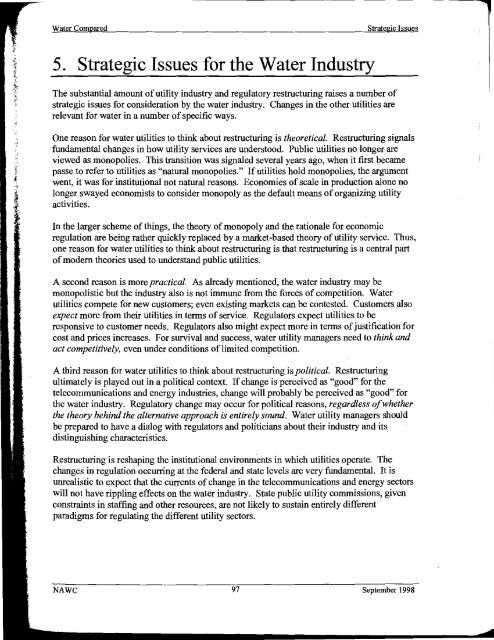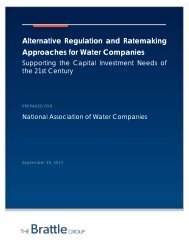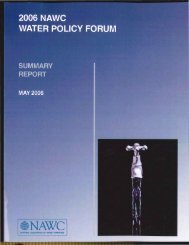BEECHER - NAWC
BEECHER - NAWC
BEECHER - NAWC
You also want an ePaper? Increase the reach of your titles
YUMPU automatically turns print PDFs into web optimized ePapers that Google loves.
Water ComparedStrategic Issues5. Strategic Issues for the Water IndustryThe substantial amount of utility industry and regulatory restructuring raises a number ofstrategic issues for consideration by the water industry. Changes in the other utilities arerelevant for water in a number of specific ways.One reason for water utilities to think about restructuring is theoretical. Restructuring signalsfundamental changes in how utility services are understood. Public utilities no longer areviewed as monopolies. This transition was signaled several years ago, when it first becamepasse to refer to utilities as "natural monopolies." If utilities hold monopolies, the argumentwent, it was for institutional not natural reasons. Economies of scale in production alone nolonger swayed economists to consider monopoly as the default means of organizing utilityactivities.In the larger scheme of things, the theory of monopoly and the rationale for economicregulation are being rather quickly replaced by a market-based theory of utility service. Thus,one reason for water utilities to think about restructuring is that restructuring is a central partof modern theories used to understand public utilities.A second reason is more practical. As already mentioned, the water industry may bemonopolistic but the industry also is not immune from the forces of competition. Waterutilities compete for new customers; even existing markets can be contested. Customers alsoexpect more from their utilities in terms of service. Regulators expect utilities to beresponsive to customer needs. Regulators also might expect more in terms of justification forcost and prices increases. For survival and success, water utility managers need to think andact competitively, even under conditions of limited competition.A third reason for water utilities to think about restructuring is political. Restructuringultimately is played out in a political context. If change is perceived as "good" for thetelecommunications and energy industries, change will probably be perceived as "good" forthe water industry. Regulatory change may occur for political reasons, regardless of whetherthe theory behind the alternative approach is entirely sound. Water utility managers shouldbe prepared to have a dialog with regulators and politicians about their industry and itsdistinguishing characteristics.Restructuring is reshaping the institutional environments in which utilities operate. Thechanges in regulation occurring at the federal and state levels are very fundamental. It isunrealistic to expect that the currents of change in the telecommunications and energy sectorswill not have rippling effects on the water industry. State public utility commissions, givenconstraints in staffing and other resources, are not likely to sustain entirely differentparadigms for regulating the different utility sectors.<strong>NAWC</strong> 97 September 1998
















